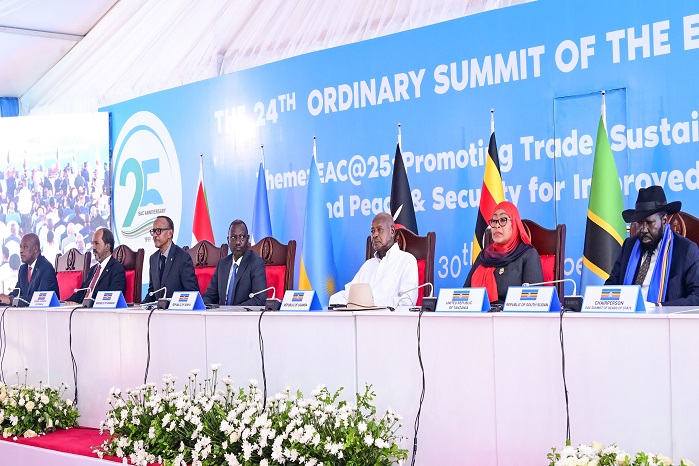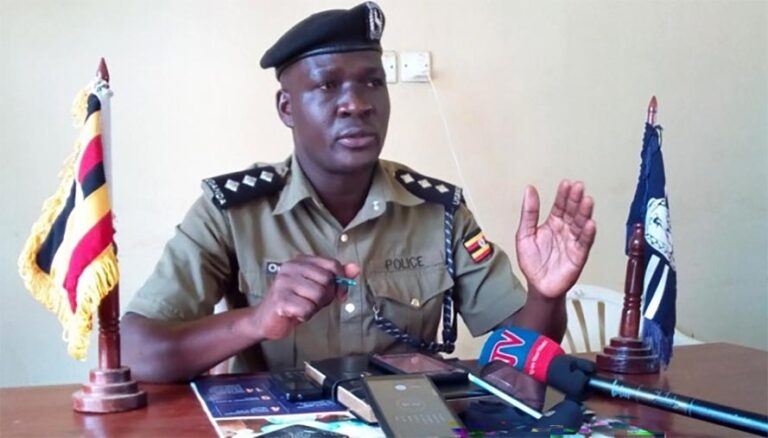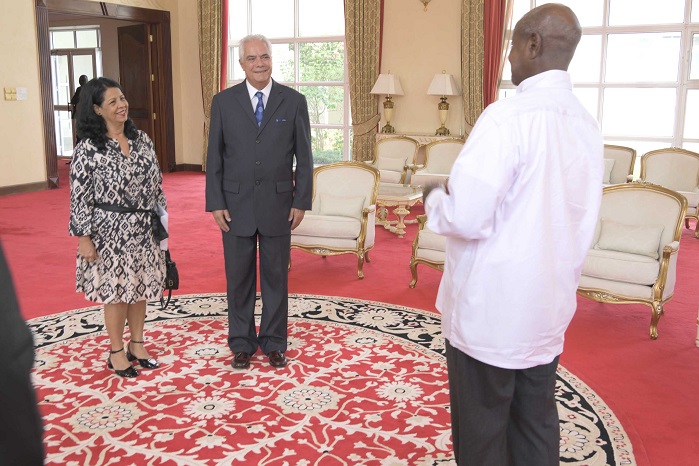
EAC presidents attending the 25th EAC summit in Arusha, Tanzania on Saturday 30th 2024
HABARI DAILY I Kampala, Uganda I Regional leaders have empasised the importance of unity if East Africa is to escape the doldrums of dependence on foreign sourced aid.
They were unanimous in the analogy that regional integration was key to ending grinding poverty which has ravaged the region for many years.
They made the call during the 24th Ordinary Summit of the East African Community (EAC) Heads of State at the Arusha International Conference Center, Tanzania last week.
During the summit, Samia Suluhu Hassan, the President of the United Republic of Tanzania, expressed her gratitude for Uganda’s commitment to strengthening the bonds of the EAC, stating that this cooperation is essential for ensuring the welfare and prosperity of the people in the region.
As the EAC also celebrated 25 years of progress, President Suluhu urged member countries to continue working together, saying, “Let us protect our community, for our unity is our strength.”

President Museveni walks through a military guard of honor as he departs Kilimanjaro International airport in Tanzania for Entebbe after attending the summit
Held under the theme: “Promoting Trade, Sustainable Development, Peace and Security for Improved Livelihoods”, the two-day summit brought together regional leaders to deliberate on key issues affecting the bloc.
The summit, which began on November 29th and concluded on November 30th, 2024, provided a platform for member states to reaffirm their commitment to the goals of the East African Community.
The EAC was revived on November 30, 1999, through the leadership of President Museveni of Uganda, President Daniel arap Moi of Kenya and President Benjamin Mkapa of Tanzania.
These leaders united to rebuild the EAC, which had collapsed in 1977, emphasizing regional integration to promote economic growth, political stability, and shared prosperity.

President William Ruto of Kenya hands over a certificate of excellence to Kololo Secondary School student Flavia Ayikoru who emerged winner
Their collective efforts resulted in the signing of the treaty to re-establish the EAC, which came into effect on July 7, 2000, with Uganda, Kenya and Tanzania as founding members.
Today, the community has grown to include eight-member states; Burundi, Democratic Republic of Congo, Kenya, Rwanda, South Sudan, Tanzania, Uganda, and Somalia representing a combined population of over 300 million people.
William Ruto, the Kenyan President who assumed the Chairmanship of the EAC during the summit, lauded Ugandan President Museveni for his enduring commitment to fostering regional integration and unity within the community.
He highlighted his counterpart’s consistent leadership and dedication to advancing the bloc’s vision.
“Mzee Museveni has been a cornerstone of the East African integration journey. His steadfast efforts have not only anchored the aspirations of our forefathers but have also provided a guiding framework for the present and future of the community,” President Ruto said.

President Museveni shares a light moment with outgoing EAC chairman President Salva Kiir of South Sudan during the EAC summit in Arusha
Prosper Bazombanza, Burundi’s Vice President highlighted President Museveni’s influence in shaping the bloc’s integration agenda and fostering regional unity.
He acknowledged President Museveni’s ability to address the challenges facing the EAC, especially in promoting peace and stability across the region.
“Burundi remains committed to building on your legacy and working with all member states to ensure that the East African Community continues to thrive as a beacon of hope and prosperity for our people,” the Vice President concluded.
Veronica Nduva, the EAC Secretary General, recognized the pivotal role of the founding fathers of the modern EAC for their outstanding contribution to the regional integration efforts.
“Leaders like President Museveni have been our teachers, restorers, and unifiers, guiding our community back to its founding principles,” she said.
Leaders and elders have played a pivotal role in realizing the dreams of the EAC founders, underscoring their leadership in restoring and advancing the aspirations of the community.

Departure from Kilimanjaro International airport in Tanzania for Entebbe after attending the summit
They were further hailed for continuously championing the cause of unity and cooperation within the East African region.
“Their tireless efforts have ensured that the EAC has seen remarkable strides towards integration and collective development, fostering a sense of brotherhood among the member states.”
Poverty is a significant issue in the EAC, where the richest 10% of East Africans earn 47% of the region’s pre-tax national income, while the poorest 50% earn 13.3%.
The region’s rapid population growth, whose rate is close to 3% per year, has made it difficult to improve social indicators.
Additionally, poor governance in the region has led to chronic poverty through corruption, lack of infrastructure, and lack of opportunities.

EAC member presidents attending the 25th EAC summit in Arusha, Tanzania on Saturday
The region is also being tormented by food insecurity, where erratic weather patterns, such as drought and flooding have hit the rural and nomadic communities.
In unison, the EAC have embarked on strategies to boost social protection, in order to help vulnerable populations overcome their exposure to risks. This strategy includes policies and programs to promote efficient labor markets, reduce people’s exposure to risks, and enhance their capacity to protect themselves.




